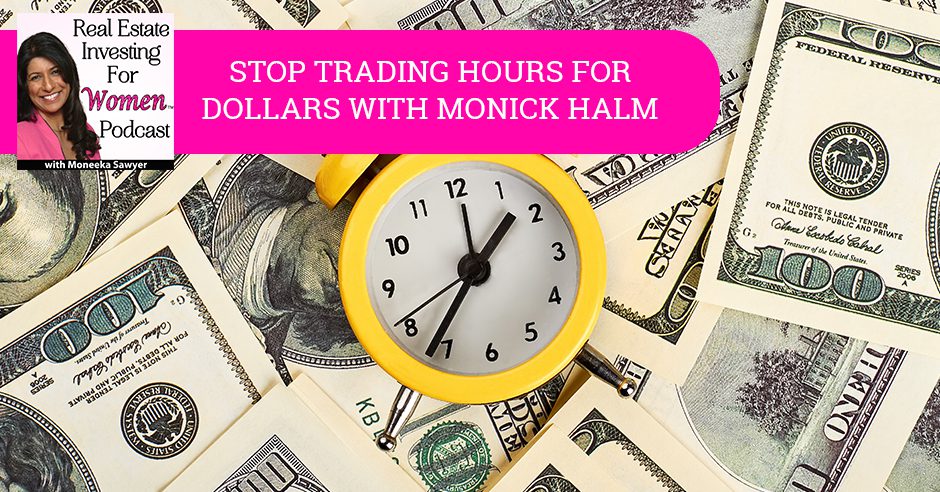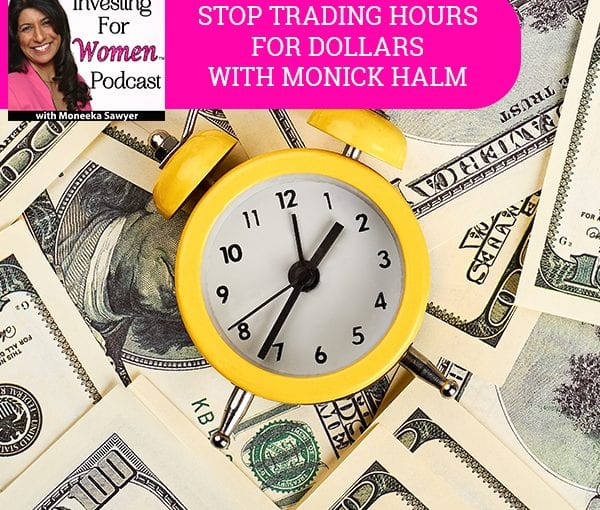Stop Trading Hours for Dollars with Monick Halm
Monick Halm is the founder of Real Estate Investor Goddesses. She is an educator and advocate for female real estate investors, and has a mission to help 1 million women achieve financial freedom through real estate. Monick is herself a real estate investor and syndicator, and owns, together with her investors, over 1300 rental units across six states.
She is also the #1 bestselling author, podcast host, Real Estate Strategy Mentor, wife, and mother of three amazing kids.
In this episode of EXTRA we talk about:
- A deeper explanation of the mechanics of a syndication
- What asset classes might be best for you
——————————————————
Learn how to create a consistent income stream by only working 5 hours a month the Blissful Investor Way.
Grab my FREE guide at http://www.BlissfulInvestor.com
Moneeka Sawyer is often described as one of the most blissful people you will ever meet. She has been investing in Real Estate for over 20 years, so has been through all the different cycles of the market. Still, she has turned $10,000 into over $5,000,000, working only 5-10 hours per MONTH with very little stress.
While building her multi-million dollar business, she has traveled to over 55 countries, dances every single day, supports causes that are important to her, and spends lots of time with her husband of over 20 years.
She is the international best-selling author of the multiple award-winning books “Choose Bliss: The Power and Practice of Joy and Contentment” and “Real Estate Investing for Women: Expert Conversations to Increase Wealth and Happiness the Blissful Way.”
Moneeka has been featured on stages including Carnegie Hall and Nasdaq, radio, podcasts such as Achieve Your Goals with Hal Elrod, and TV stations including ABC, CBS, FOX, and the CW, impacting over 150 million people.
Stop Trading Hours for Dollars with Monick Halm

Sometimes, a six-digit salary doesn’t mean anything if it requires you to work a crazy amount of time and has nothing left for yourself and the people around you. Monick Halm is here to teach you how you can stop trading your hours for money. She is the Founder of Real Estate Investor Goddesses, and has a goal to bring in more women into the industry. Monick shares her story about how a lawyer transitioned into real estate during the previous recession and how real estate became her family’s saving grace. Listen in as Monick talks about the different recession-resistant asset classes that can minimize the risk for your investments while providing quite a hefty return.
—
Listen to the podcast here
Stop Trading Hours for Dollars with Monick Halm
I am excited to welcome to the show, Monick Halm. She is the Founder of Real Estate Investor Goddesses. She is an educator and advocate for female real estate investors and has a mission to help one million women achieve financial freedom through real estate. Monick herself is a real estate investor and syndicator. She owns together with her investors over 1,300 rental units across six states. She is also a number one bestselling author, podcast host, real estate strategy mentor, wife, and mother of three amazing kids. Monick, welcome to the show.
Thanks for having me. I’m happy to be here.
I’m happy you’re here too. Could you tell us a little bit about your story?
My story in real estate investing was completely by accident. I grew up a first-generation American. My parents are from Haiti and they always told me, “You can do anything you want as long as you’re a doctor, lawyer, professor, engineer.” I was not into math and sciences. I was like, “I’ll be a lawyer.” I went to law school, then I was in a big firm. The only thing that they ever taught me with regards to real estate was to buy your own home or buy a house. If I get a job, buy a house, put money in retirement, work until 65, get a gold watch, go for a few years, that was it.
I was miserable as a lawyer but that’s a whole other conversation. I was a lawyer for a few visible years and I thought it’s time to buy a house. Even though I had a six-figure income, I lived in Los Angeles. You’re in San Francisco. You understand expensive market values. This was in 2005, towards the top of the last bubble. A modest house in a modest neighborhood. I’m not talking about a mansion in Beverly Hills and Bel Air. It’s a modest house in a neighborhood where you’re not going to have drive-by shootings. It was upwards of $600,000, $700,000. I couldn’t do that by myself, but a friend of mine who was in a similar boat suggested that we buy a duplex together.
He would live on one side and I’d live on the other. I was like, “I can buy half a house. Let’s do that.” Instead of finding a house with two equal sides, we ended up finding this old craftsman. It’s a beautiful property that had a larger unit downstairs, a two-bedroom unit upstairs, and a converted garage in the back. Instead of each taking a unit, we each took a bedroom in the larger unit. We rented out the upstairs, the back house, and even the basement. We were house hacking before that was a thing. I was like, “This is awesome. It’s paying my mortgage. It was great.” I thought of it as free housing but I wasn’t thinking about it as a way to escape law, which I should have because I’m miserable. When I met my husband, he had a duplex. Now we’ve got a single-family together. It was in LA, barely cashflowed but we had it. At the time, I didn’t realize that you could invest out of state. I thought you had to invest where you live.
Then 2008 happened but before that, we got married in 2007 and I got pregnant. When I was about close to six months pregnant, my boss at the law firm I was working called me. I thought I’m going to get a bonus. I’ve been working hard, but instead of getting a bonus, I got fired, which was completely shocking and terrible. That week that I got fired was the week that I’d gone from looking fat to looking pregnant. I would never like that. My sister was pregnant at the same time. She had this cute baby bump from the get-go. I looked back and I had just gotten that bump. I was so excited until I got fired. I was like, “How am I going to get a job? I look so pregnant right now.” I thought, “Forget it. I’m not going to look for a job. I’m going to wait until I give birth, have a short maternity period, then I’ll find another job.” My baby was born in late August of 2008. Within a month, the market was in free fall. It’s giving me a lot of flashbacks of what it was like then. I’m grateful I’m in such a different place than I was at that time. I didn’t have my job and then my husband who is a self-employed graphic designer works in the music industry. His business went down 90% at the same time. It was tough.
Our real estate helped sustain us. It kept a roof over our head. It was still a struggle but we were able to sell one property and we started to flip when houses were on sale. We flipped until about 2015 and they were not quite on sale. It was competitive and flipping is a job. You get the house and hopefully, you make a profit. Knock on wood, we always made a profit but you have to start all over again. There’s got to have something a little more passive. I started looking for a fourplex in LA and it was so expensive, nothing cashflowed. It made no sense. I was frustrated. It was hard to flip and at that point, we were pretty much doing real estate full-time.
At that moment I met a mentor. Robert Helms is the host of the Real Estate Guys Radio podcast. I met him through a mutual friend. She said, “You should meet my friend, Robert. He’s done hundreds of thousands in real estate. He’s going to be in LA. You should come to meet him and maybe he can give you some advice.” I go and meet Robert. I’m telling him about the flipping and the fourplex. He goes, “LA is a tough market. I always say live where you want to live. Invest where the numbers make sense.” I’m nodding and I was like, “Until you said that, I had never thought of that. It hadn’t occurred to me that that was a possibility.” It was like, “What?” That opened up the whole world to me. The next thing he said was, “You can buy this fourplex by yourself if you limit your own capital credits. Alternatively, you could bring a group of investors together and buy a 100, 200-unit apartment building.”
He started telling me about the benefits of that. You could share the wealth and the risk. You can go much further faster. I was mind-blown, “What? I want to do that.” At that point, I thought that you needed Donald Trump’s bank account to do that stuff. I have no idea that was a possibility at all. I also realized that I want to be around people who think 200-units is normal. Up until then, everyone around me thought fourplex was a big deal. I went to learn how to do this thing called syndication, which is bringing groups of investors together. We got started in 2016 and that first year, we went from having our 2 units to over 1,000 by doing syndications. We’ve since sold them and bought more. It’s been an incredible and fun journey. That’s my story.
90% of millionaires get to be so through real estate. Share on XI haven’t had anybody on the show that does their own syndication. I’ve had one other person. I’m interested to hear a little bit more about how you bring your investors together and what syndication looks like in your world.
When I went to that first conference, Robert Helms and his partner Russell Gray, they do a conference called Secrets of Successful Syndication and he told me about it. I met him on October of 2015 in LA and he was like, “We’re doing this thing. It’s going to be in January 2016 in Phoenix.” I went home that night and told my husband, “We’re going to do this. We’re going to learn how to do this.” We bought tickets that night. When I went there, they were talking about when you are building syndication and you like to get investors, you have to build a brand and build a network. That was important. Think about who do you want to work with. That was a Friday and Saturday conference.
Sunday morning, I’m in the hotel gym. I’m on the elliptical and going through my head is what they talked about. Who do I want to work with? Who am I going to build a brand and network? In between being a lawyer full-time, while I was doing the real estate, I became a life coach. I became an abundance coach for women. I was already coaching women around money and abundance. It’s something that I started to move away from because I was focusing more and more on the real estate, but I already had that thing with women and money. I’m thinking, “Who do I want to work with?” I started thinking about that room that I’d been at that conference. In a room of 120 people, maybe nine of us were women. It was much less than 10%. That’s typical. There were maybe fifteen speakers on their stage and one woman, something like that. All of a sudden it hit me. I was like, “There are no women. I want to work with women. I need to bring women. This is who I want to work with.”
I studied the Divine Feminine for a long time and I’ve been in groups of women. It came as this divine download like that’s what I meant to do. As we set out to start our syndication business, we started working with investors that we’d meet at different conferences. I was focused on how do I invite women into this real estate game knowing that I’ve been working with women around money, wealth, and abundance. This is the best way in my opinion that you’re going to build wealth and 90% of millionaires get to be so through real estate. Nobody’s talking to women about this. Now you are but I was googling and nobody’s doing this.
More of us women are talking to women about real estate, but there are still far too few of us. For the 50% of the population that we are, there is not enough. We still need more voices inviting women into this game. There’s this button-up world that women aren’t told or taught that this is an option for them, that this is something they can do. They’re often not seeing people that look like them. If you go to your typical conference, it’s all men. Mostly, they’re old white men.
It’s so true. You’re like, “I don’t belong here.”
I felt like a unicorn. I was so different from everybody in the room. In certain ways, that worked for me. It was memorable and that served me, but this needs to change. Focusing on women has been one of the main ways in which we have been able to grow our investor list. At first, most of our investors were men. Ninety percent were men on our first few deals. Now, it’s the opposite numbers. Ninety percent are women investors, which makes me happy. It’s letting them know that it’s out there and there are these passive investing opportunities for people that are often at least as abundant and at least has high ROI as a lot of the deals that you do yourself. Our passive investors are making way higher returns than I was making with my properties in LA or properties where I was doing all the work. It’s letting people know that this exists and that it’s possible.
What do your syndications look like? What properties do you offer? How do they work?
We get larger commercial projects, typical ones. We do a B-class commercial or apartment building. Our second to the last project that we did was a 250-unit in Atlanta, B-class, suburb of Atlanta, a nice building. We get bank financing for 75%. We then raised money with investors for 25%, the down payment plus some capital expenditure funds and cash reserves. That was a pretty big deal. We raised $8 million with that one. What we do is we buy these value-add properties. It’s still a nice building but the units could have been upgraded.
The rents were a little bit below market to these neighbors. Property management could have been improved. We brought in new property management. We started improving the units and increasing rents. How it works though is as we cashflow, we give distributions to our investors. They’re getting them every month. Monthly or quarterly, they’ll get distributions of the profit. When we raise the net operating income, we sell the property. The investors get a share of the equity rates.

Stop Trading Hours: Senior housing is a good investment because of the demographics. You have 10,000 people a day turning 65.
Do you manage that whole thing or are you a partner with somebody else that manages that whole thing?
We’ve done some where we’ve done all of it. As I’ve gone I’ve realized, what do I love to do and what do I not love doing as much. What I love doing more is being on the investor side. I love talking to people. I love getting them to different opportunities. What we do is we vet deals. We have partners that we work a lot with and that have decades of experience, and we know, love, and trust them. They’ll bring different opportunities to us. If that makes sense for our investor, we’ll partner with them. We bring the money. We’re part of the team that’s managing, but we’re not as involved in the day-to-day management.
You mentioned that the strategy has changed a little bit. You’ve gone from increasing rents to mitigating loss.
At least the NOI is the same. If you keep the NOI from going down, we’re like, “This is a win.”
That’s a perfect segue to this next piece that I wanted to talk to you about. I had a summit and you’re having a summit. The conversation is about asset classes that are recession-resistant. Could you talk to me a little bit about what those asset classes are and what that looks like?
I still think that B-class apartments are a recession-resistant investment. It’s one thing if the whole economy stops and nobody’s working at all. That doesn’t normally happen. It’s not going to happen long-term. Normally, it’s not like a full stop on the economy. Most things are not going to do very well in this type of environment. It hasn’t been as bad because a lot of our tenants are more white collar. They’re more able to work from home. It hasn’t been the blood bath we feared. April was okay. As it progresses, people’s ability to pay rent may go down. Generally speaking, in strong metro areas where we invest, whether it’s a diverse economy, you have different industries and corporations. Atlanta is not going to fully go under. They have many different corporations from Coca-Cola to CNN and the largest airport in the world. Eventually, the planes will fly again and people will drink Coke. There’s enough diversity and strong businesses there. Atlanta is not going to end as a city.
There’s always that need for middle-class housing as people might lose their homes. What are they going to do? They’re going to move into apartments. Baby Boomers have been downsizing from their houses to the apartments. Millennials who weren’t able to buy homes because it was too expensive. The prices might go down. They might be able to buy, but people are skittish about buying. They’re going to be in apartments. In most strong markets, there’s always that need for that level of housing. That’s a smart bet.
Mobile homes are poised to do well as well. They are low-income housing. People can buy mobile homes for $30,000. It’s quite a bit in the same area as a stick-built house that’s often 5, 10 times more than a mobile home would be. People can live in mobile homes. They pay a lot fee. They can buy their home for very little. You can invest like buy and sell mobile homes or we have a mobile home park. You own the land. They pay you a lot fee to have their home on the land. There’s the pride of ownership because they own their homes. It’s a low-cost point. There’s a growing need for that.
There are always people that can’t pay their property taxes. They will sell tax lien. There’s probably going to be more tax liens if not less, I would imagine, in the coming days and years. There’s always a need for tax liens. Another interesting asset class that most people don’t think about is land investing. I interviewed a woman on the summit who does that. She buys land and sells it mostly through seller financing. She’s cashflowing, seller financing on her land. She makes $70,000 a month selling land. You can often get it at pennies on the dollar through different strategies. Land investing, with strategies that she teaches, you could do that.
Other things that have the capacity is assisted living or senior housing because of the demographics. It’s a silver tsunami. You have 10,000 people a day turning 65. The Boomers are getting into this. We have a good 15, 20 years of this Boomer generation and there’s not enough supply already for those that are coming. It’s going to be even more every day. There’s a huge opportunity in assisted living facilities and senior housing.
When building a syndication to get investors, remember: build a brand, build a network. Share on XOther things that have a lot of potentials. We bought a deal that we closed on. It was a cold storage facility for a frozen food manufacturer. We’re looking at a few similar projects that are essential businesses and industrial. Not so much office and retail. I don’t know how they’re going to do, but there’s a lot of demand for different types of industrial space. That isn’t an asset class that we’re looking for, but it’s going to depend on who the users are and how well that does.
Section 8 Housing is a government-subsidized housing. We have some Section 8 portfolio in Jackson, Mississippi. Those are the properties where we don’t know when we’re getting paid on those. Everywhere else we’re like, “Are we going to get paid this month? I don’t know,” but that’s good to go. Low-income housing like the C-class apartments, if it’s not Section 8, that’s a pretty fragile group. A lot of them are hourly. Those are the ones that are unemployed and lost their job. That’s a little more fragile than the B-class, but if it’s Section 8, then that’s a good market to look into.
I know that there are a lot of details around all of those things and people will want to hear more. Why don’t you tell everybody how they can get in touch with you and find out a little bit more about the summit. By the time everybody is reading this, the summit will have passed. Can they still get access to it later? How does that work for you?
They’ll be able to get the replay. They’ll be able to purchase that. You can find me at REIGoddesses.com and @REIGoddesses mostly on social, Instagram, Twitter, Facebook. Look at REI Goddesses and you’ll find me, but the website is the best place to head.
I liked that she says goddesses because she wants all of us to be the goddesses. She’s not the only real estate goddess out there. I know you have a free gift for my ladies. Could you tell us a little bit about that?
I have The Real Estate Success Blueprint guide that I created. It’s seven steps to take to successfully invest. These steps are foundational principles that you can use that will help you to be successful in any economic environment. It’s like the basics of real estate investing.
I want to dive a little bit deeper into the passive investing model. We’re going to do that in EXTRA. Ladies, what we’re going to talk about is how to create passive income with recession-proof assets.
It can also be recession-resistant.
That’s such a good point. There is no such thing as you can’t lose any money ever. Real estate is like any other investment. It has its cycles. It has its ups and downs and it has its risk. The thing is that you can make different decisions to help to protect yourself. There are higher risks that could have higher returns but are more likely to be susceptible and vulnerable to economic change. This is true in everything. If you’re looking at real estate, stocks and bonds, whatever it is that you’re looking at, there are assets that are going to be more recession-resistant.

Stop Trading Hours: Some of these recession resistant investments or asset classes are quite high return and they’re not necessarily high risk.
I don’t want to say that high return equals high risk. Some of these recession-resistant investments or asset classes are quite high return. They’re not necessarily high risks. A lot of them are higher return because they’re not as sexy and not as many people are chasing after those asset classes. You can still have a lot of high returns, but the characteristics of those asset classes make it so even when the economy’s down. I remember the last one, self-storage is also a good recession-resistant asset class.
I’ve been hearing a lot about. Based on what you said, EXTRA got that much more interesting. We got recession-resistant, passive income asset opportunities that still have high returns. I want to hear all about that. We’re going to hear about that in EXTRA. For now, thank you so much, ladies, for joining Monick and me for this portion of the show. Monick, thank you so much for sharing everything that you’ve shared so far.
Thanks for having me.
It’s nice to finally chat. We are two voices out there floating in the wind. I’ve been so eager to meet you. This has been fantastic. Thank you. Stay tuned for EXTRA if you’re already a subscriber. If you’re not a subscriber but would like to be, go to RealEstateInvestingForWomenExtra.com. When you go there, you’ll notice that you get seven days for free. I’ve got 35 to 50 episodes up there. You can binge on a ton of those, get as much information as you like, then you can decide if you want to be a member or not. You’ve got seven days to check it out. Go over there and take a look. For those of you who are leaving us now, thank you so much for joining Monick and me for this conversation. I look forward to seeing you next time. Until then, remember that goals without action are just dreams. Get out there, take action and create the life your heart deeply desires. I’ll see you next time. Bye.
—
Thank you for joining me. If you love this show, please subscribe, rate and review it on iTunes. As women, we need to support and empower each other to build wealth and live joyful lives. Your support of this show by subscribing, rating, and reviewing will help other women like you to learn about building blissful wealth through investing. Remember to download your free report so you can get started on your investing journey at BlissfulInvestor.com. I’ll see you next time.
Important Links
- Real Estate Investor Goddesses
- Real Estate Guys Radio – podcast
- REIGoddesses.com
- @REIGoddesses – Instagram
- Twitter – REIGoddesses
- Facebook – REIGoddesses
- The Real Estate Success Blueprint
- RealEstateInvestingForWomenExtra.com
- iTunes – Real Estate Investing For Women podcast
About Monick Halm
 Monick Halm is the founder of Real Estate Investor Goddesses. She is an educator and advocate for women to create real wealth through real estate. She is herself a real estate investor, syndicator, and developer with over 14 years of real estate investing experience in multi-family, mobile home parks, RV parks, flipping, commercial, vacation rentals, syndication, and ground-up development. Together with her husband Peter Halm, and her investors, she owns over 1300 rental units across 6 states.
Monick Halm is the founder of Real Estate Investor Goddesses. She is an educator and advocate for women to create real wealth through real estate. She is herself a real estate investor, syndicator, and developer with over 14 years of real estate investing experience in multi-family, mobile home parks, RV parks, flipping, commercial, vacation rentals, syndication, and ground-up development. Together with her husband Peter Halm, and her investors, she owns over 1300 rental units across 6 states.
Her mission is to assist 1 million women to achieve financial freedom through real estate. She is the #1 bestselling author of The Real Estate Investor Goddess Handbook and Wealth for Women: Conversations with the Team That Creates the Dream, and host of the Real Estate Investor Goddesses Podcast. She is also a Real Estate Strategy Mentor, a Huffington Post contributing author, keynote speaker, recovered attorney, certified interior designer, Feng Shui expert, avid world traveler, wife and mother of three amazing kids.
Grab Monick’s Real Estate Success Blueprint: 7 Crucial Steps to Be a Successful Real Estate Investor. realestateinvestorgoddesses.com/free-blueprint-ebook-1
Moneeka Sawyer is often described as one of the most blissful people you will ever meet. She has been investing in Real Estate for over 20 years, so has been through all the different cycles of the market. Still, she has turned $10,000 into over $5,000,000, working only 5-10 hours per MONTH with very little stress.
While building her multi-million dollar business, she has traveled to over 55 countries, dances every single day, supports causes that are important to her, and spends lots of time with her husband of over 20 years.
She is the international best-selling author of the multiple award-winning books “Choose Bliss: The Power and Practice of Joy and Contentment” and “Real Estate Investing for Women: Expert Conversations to Increase Wealth and Happiness the Blissful Way.”
Moneeka has been featured on stages including Carnegie Hall and Nasdaq, radio, podcasts such as Achieve Your Goals with Hal Elrod, and TV stations including ABC, CBS, FOX, and the CW, impacting over 150 million people.

